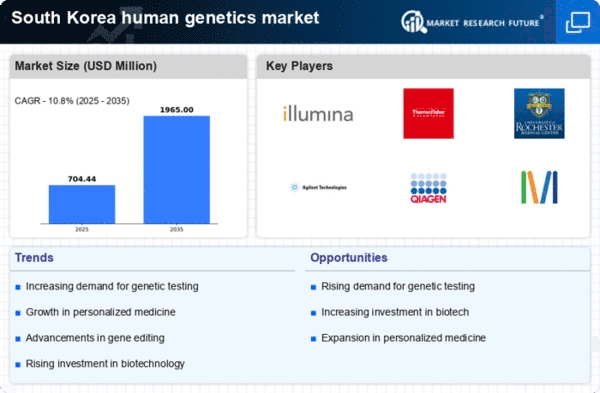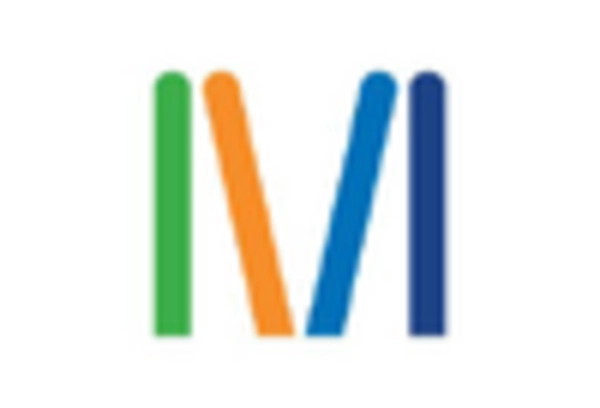Advancements in Genomic Research
Innovations in genomic research significantly impact the human genetics market in South Korea. The country has invested heavily in research and development, leading to breakthroughs in understanding genetic disorders and their treatments. As of 2025, South Korea ranks among the top nations in genomic research output, contributing to a robust pipeline of new genetic therapies and diagnostic tools. This research not only enhances the understanding of complex diseases but also fosters collaborations between academic institutions and biotechnology firms. The continuous evolution of genomic technologies, such as CRISPR and next-generation sequencing, is expected to drive the human genetics market forward, creating new opportunities for personalized medicine and targeted therapies.
Rising Demand for Genetic Testing
The human genetics market in South Korea experiences a notable increase in demand for genetic testing services. This surge is driven by a growing awareness of hereditary diseases and the desire for personalized medicine. As of 2025, the market for genetic testing is projected to reach approximately $1.5 billion, reflecting a compound annual growth rate (CAGR) of around 10% over the past few years. Consumers are increasingly seeking genetic information to make informed health decisions, which propels the growth of the human genetics market. Furthermore, advancements in technology have made genetic testing more accessible and affordable, further stimulating demand. The integration of genetic testing into routine healthcare practices is likely to enhance the overall landscape of the human genetics market.
Increased Focus on Preventive Healthcare
the market is witnessing a shift towards preventive healthcare, which is reshaping consumer behavior and healthcare practices. As individuals become more health-conscious, there is a growing inclination to utilize genetic testing for early detection of potential health risks. This trend is supported by government initiatives promoting preventive health measures, which aim to reduce the burden of chronic diseases. By 2025, it is estimated that the preventive healthcare segment will account for over 30% of the human genetics market. This focus on prevention not only enhances patient outcomes but also drives the demand for genetic counseling and testing services, thereby expanding the market.
Growing Investment in Biotechnology Startups
The human genetics market in South Korea benefits from a burgeoning ecosystem of biotechnology startups focused on genetic research and applications. Increased venture capital investment in these startups is fostering innovation and accelerating the development of new genetic therapies and diagnostic tools. As of 2025, it is projected that investment in biotechnology startups will exceed $500 million, reflecting a strong interest in the potential of genetic solutions. This influx of capital is likely to enhance the competitiveness of the human genetics market, as startups bring fresh ideas and technologies to the forefront. The collaboration between established companies and emerging startups may further drive advancements in the field.
Integration of Artificial Intelligence in Genetics
The integration of artificial intelligence (AI) into the human genetics market in South Korea is transforming the landscape of genetic research and diagnostics. AI technologies are being utilized to analyze vast amounts of genetic data, leading to more accurate predictions of disease susceptibility and treatment responses. As of 2025, the application of AI in genetics is expected to enhance the efficiency of genetic testing processes, reducing turnaround times and costs. This technological advancement is likely to attract more healthcare providers to adopt genetic testing services, thereby expanding the human genetics market. The synergy between AI and genetics may also pave the way for innovative solutions in personalized medicine.
















